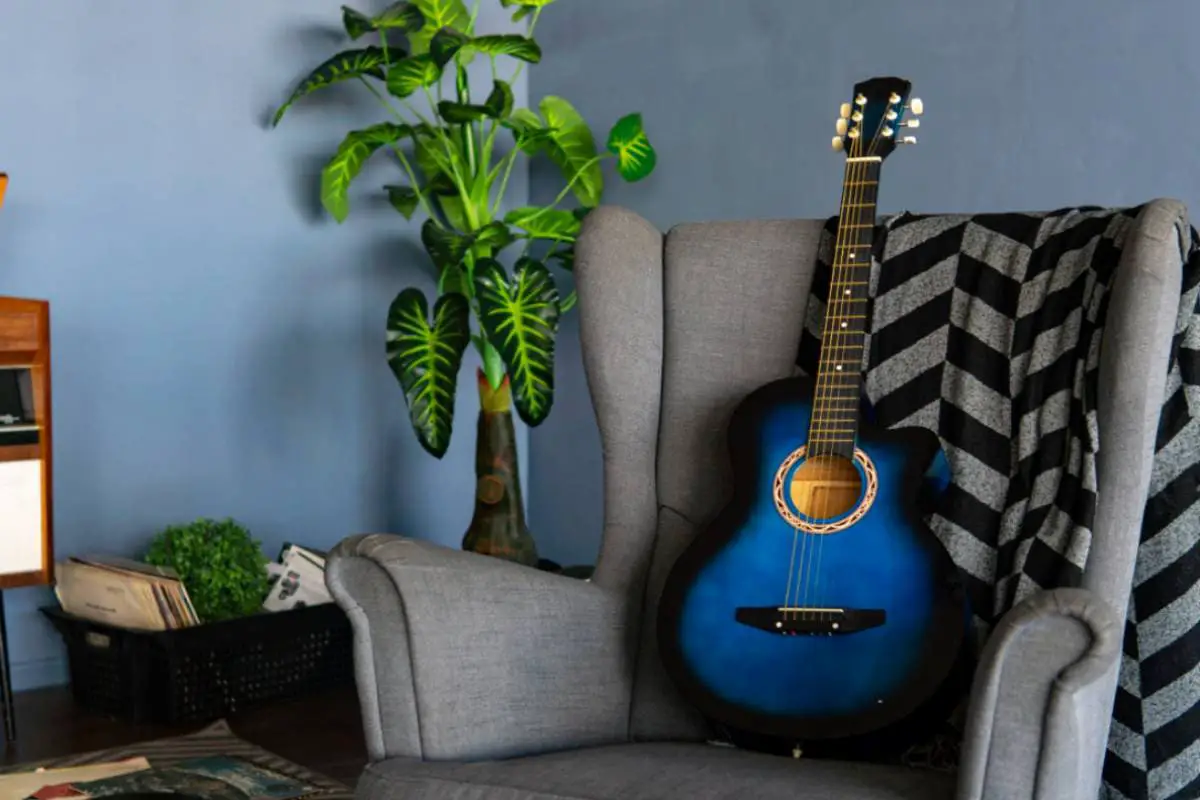Anyone who owns a guitar is usually proud to have it in their possession. Therefore, musicians must know how best to store their guitars; otherwise, the instrument can get severely damaged or even destroyed. Luckily, there’s no shortage of storage options available for guitar owners.
Here are 13 ways to store a guitar when not in use:
- Control climatic conditions.
- Store in the center of the room.
- Prevent exposure to direct sunlight.
- Store the guitar in a hard case.
- Store guitars in an upright position.
- Reduce string tension.
- Use a guitar stand.
- Buy a guitar rack.
- Consider a wall mount.
- Place the guitar on a shelf.
- Get a guitar cabinet or display case.
- Detach vibratos during storage.
- Clean the guitar before storage.
What follows is an in-depth look into each method of guitar storage. Applying any of the following storage tips will help protect and prolong the lifespan of your guitar.
👇😀👇NOTE👇😀👇
If you want to find out what my recommended guitar gear is, then here is what I recommend on Amazon:
- Fender Cutaway Acoustic-Electric Guitar Bundle (MY FAVORITE GUITAR)
- Snark SN-8 Super Tight All Instrument Tuner (Easiest Tuner I’ve Used😏)
- 6 String Acoustic Guitar Capo (Best CAPO for quick changes)
- Dunlop Max Grip 1.0mm Nylon Picks (Thick Guitar Pick So You Don’t Lose Grip!)
- Universal Guitar Stand (Cheap & Minimalist Guitar Stand I Recommend)
- Levy’s 2″ Wide Quick Adjust Guitar Strap (Best Guitar Strap For Any Level)
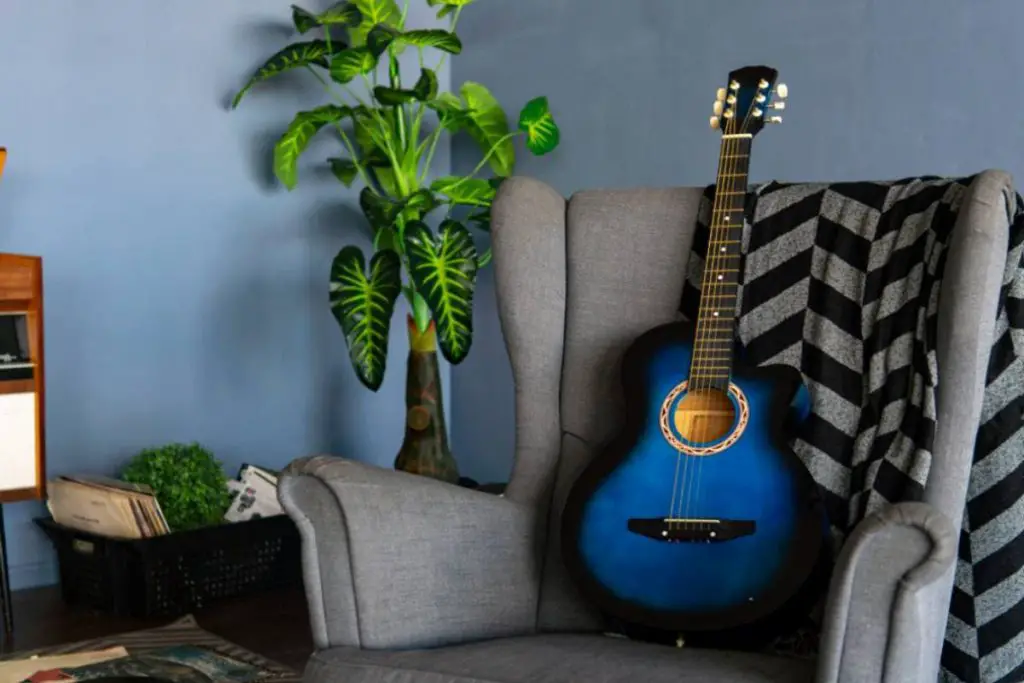
1. Control Climatic Conditions
The most commonly used material in the manufacture of guitars is wood. Wood does not react well to fluctuating climatic conditions. When exposed to extreme humidity or generally damp conditions, it tends to swell.
On the other hand, wood dries out when exposed to high temperatures. Either situation will damage wood-made guitars and change the instrument’s sound output. Therefore, you want to make sure that you’re storing your guitar in a mild environment.
The ideal temperature for long-term guitar storage is standard room temperature. However, your guitar will remain in good condition under a temperature range from 65 to 80 degrees Fahrenheit (18.3 to 26.7 degrees Celsius). Therefore, when setting your thermostat, you should ensure the temperature does not exceed that range.
Moreover, the manufacture of guitars happens under humidity-controlled conditions. As a result, their storage conditions should also mimic their manufacturing conditions. To preserve your guitar, ensure the humidity in the storage area is between 45 to 55 percent.
Given the adverse effects of extreme temperature and humidity on guitars, you must avoid storing your guitar in certain areas. For example, you should not keep your guitar in a car, especially if the temperature falls below or above the range mentioned above. Cars experience a constant shift in climatic conditions throughout the day; therefore, they are not ideal for guitar storage.
You can purchase several items to help control the climatic conditions in the rooms where you store your guitars. For example:
- A temperature and humidity monitor. The ThermoPro Digital Hygrometer Indoor Thermometer (available on Amazon.com) provides high and low temperature and humidity readings, thus, helping ensure room conditions remain within a specified range.
- A humidifier. In dry areas with low humidity, a humidifier will help increase moisture content in the air to help reach optimal humidity for guitar storage. For example, this LEVOIT Humidifier (available on Amazon.com) has 360 rotating nozzles to guarantee homogeneous moisture distribution in your room.
- A dehumidifier. It will come in handy in very humid areas since it will remove excess moisture from the air, thus preventing exposure of your guitar to excessive moisture that will ruin the wood. Consider this Letsport Upgraded 68oz Dehumidifier (available on Amazon.com) equipped with auto shut-off to prevent spills when the tank is full and save energy.
- Silica Pads. If your area experiences high humidity, consider placing silica pads in your guitar case to help absorb moisture. Make sure you replace the pads after several months or as instructed by the manufacturer.
2. Store in the Center of the Room
The temperature and humidity conditions you store your guitar in should remain consistent. One way of making that happen is by keeping your guitar around your room’s center instead of against outside-facing walls. The room’s center receives the most consistent atmospheric conditions since there are minimal factors that can contribute to temperature and humidity fluctuations.
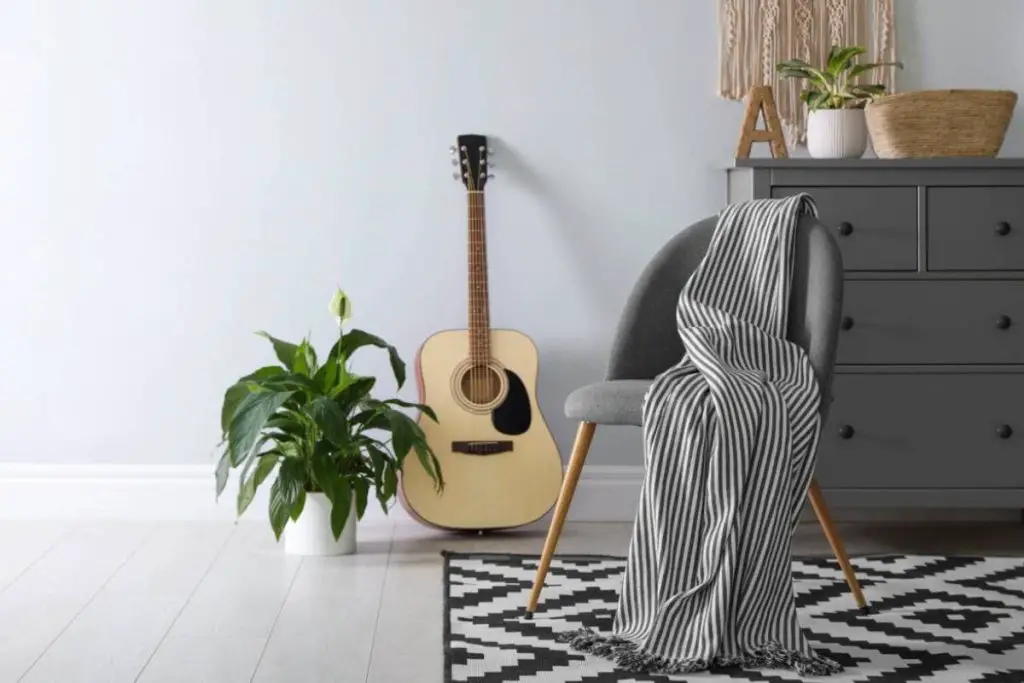
On the other hand, outside-facing walls experience exposure to elements that can cause temperature fluctuations around them. For example, in scorching places, outside-facing walls absorb heat from the sun, which guitar cases can absorb, thus exposing your guitar to sweltering conditions.
Alternatively, outside-facing walls can get freezing cold too, causing damage to your guitar’s finish. You should also avoid placing your guitar on concrete surfaces. Concrete is a porous material that absorbs moisture from its surrounding. Therefore, it will absorb the moisture in your guitar, causing dryness that increases the risk of your guitar cracking.
Moreover, some rooms in your home may not be ideal for guitar storage. These include your attic, garage, and your basement.
These rooms are usually humid and damp, which contributes to guitar damage. Moreover, do not keep your guitar near the ceiling since the temperature changes quickly depending on the time of year and weather.
Choose the space you will store your guitar carefully, and ensure you place the guitar as close to the room’s center as possible.
3. Prevent Exposure to Direct Sunlight
Exposing your guitar to direct sunlight can ruin it. In addition to bending your guitar’s wood out of shape, the heat will also destroy its finishing. Guitar finishing contains glues that make it look shiny, clean and aesthetically pleasing. However, prolonged exposure to heat can soften glue used to hold the components together, resulting in your guitar falling apart.
The sun’s rays will also contribute to cracking in your guitar’s polished finishing. Therefore, you should avoid storing your guitar in areas that receive direct sunlight, like near a window. Ultimately, you can keep the guitar in a room that does not receive any sunlight to guarantee its safety from direct sunlight.
4. Store the Guitar in a Hard Case
Hard cases are easily the best way to store your guitar when not using it. Guitars left lying around are susceptible to falling objects, someone dropping them, and environmental factors.
Moreover, other cases like gig bags do not provide enough padding to protect your guitar against external shocks that can cause damage. Gig bags are most convenient when you regularly use your guitar and help keep dirt and dust off your guitar.
A high-quality hard case will have a hard shell that will absorb external shocks like when your guitar drops, thus, protecting the instrument. A hard case will also delay the effects of sudden changes in temperature and humidity on your guitar.
Hard shell cases are available in different sizes. For instance, for a ¾-size acoustic guitar, you can consider purchasing the Gator Cases Hard-Shell Wood Case (available on Amazon.com). The case has durable black Tolex PVC-covered plywood that protects against bumps and damages.
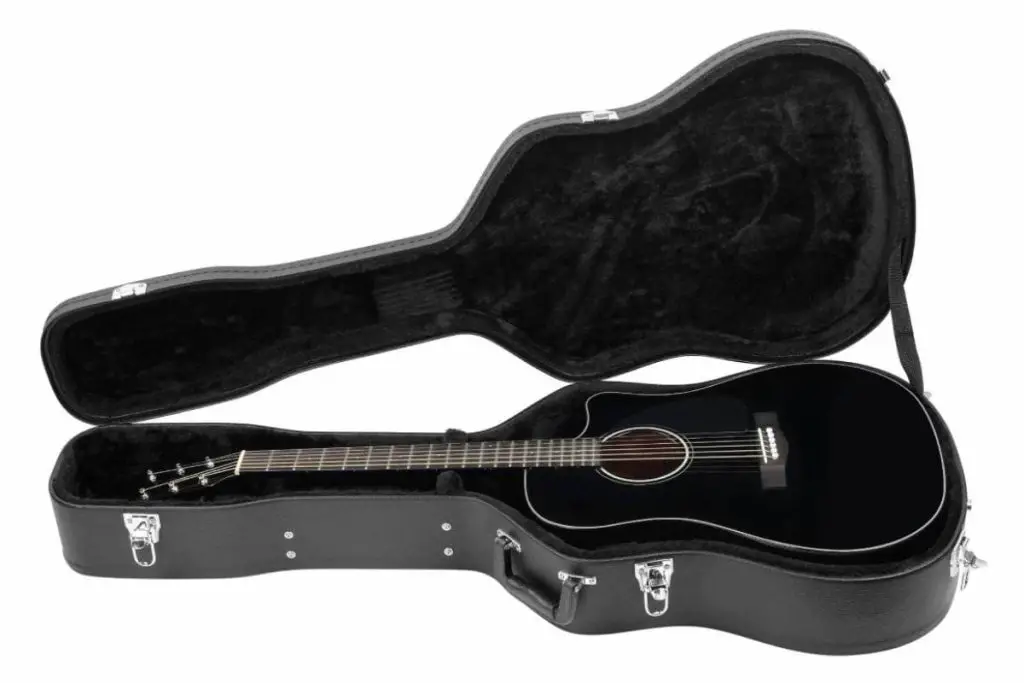
5. Store Guitar in an Upright Position
It would be best to store guitars standing up, their natural position, instead of flat on their backs. Keeping the guitar upright helps reduce tension on the guitar’s neck. If you cannot store the guitar upright, consider laying it on its side while inside a hard case with the neck pointing upwards to maintain vertical orientation.
If you own multiple guitars, when storing them, they should resemble clothes on a rack. Don’t stack them on top of each other. Stacking guitars on top of each other or placing different objects on top of them puts undue pressure on the guitar.
Prolonged stacking will damage the guitar’s structure, especially the neck making it susceptible to breaking or snapping.
6. Reduce String Tension
When storing your guitar, you want to reduce the tension on its strings. Maintaining tension on guitar strings during long-term storage can cause pulling on the neck, compromising its structure. On the other hand, you should avoid releasing excess tension since it can cause the guitar’s neck to bow.
Therefore, it is advisable to tune down your guitar strings by a half or whole step. You can also ask your guitar vendor for advice on reducing string tension. Overall, the correct amount of tension reduction will retain the structural integrity of your guitar.
7. Use a Guitar Stand
Most guitar players want to have easy access to their guitars on a daily or regular basis. A guitar stand provides a convenient way of storing your guitar short-term. It is a better option than placing the guitar on the floor or under your bed, where the chances of you stepping on it or dropping something on it are high.
Guitar stands ensure that your guitar stays upright, thus minimizing the chances of its neck bending or bowing. They are also strong, stable, and less likely to topple when accidentally knocked. All you have to do is pick a spot where your instrument will not obstruct your movement (while also being away from direct sunlight). A guitar stand can also add to your room’s aesthetic by making it the centerpiece, which can be a conversation starter whenever you host guests.
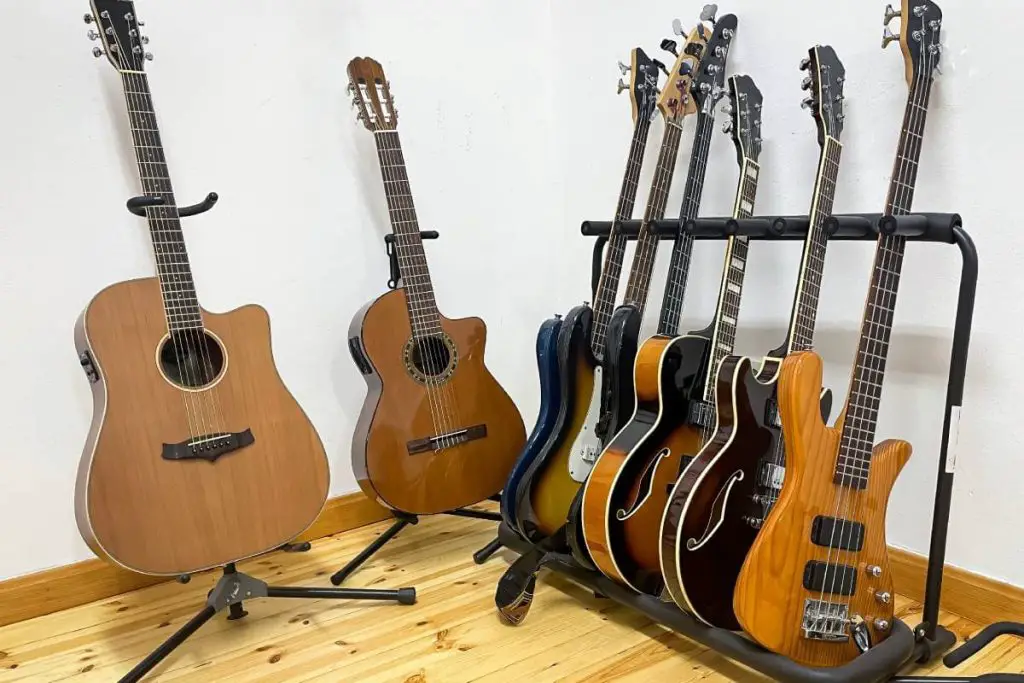
There are two common types of guitar stands:
- A-frame stands. They are portable and have a guitar stand on the bottom. For instance, the Amazon Basics Guitar Folding Stand (available on Amazon.com) has three adjustable width settings which can hold guitars of varying shapes, sizes, and types.
- Tubular Stands. They are larger than A-frame stands and hold your guitar at its bottom and neck, providing excellent stability. For example, this Gator Frameworks GFW-GTR-10002PK Single Stand available on Amazon.com has a heavy-duty steel structure with rubber padding that can carry the weight of acoustic and electric guitars.
8. Buy a Guitar Rack
Guitar racks are similar to guitar stands, with the main difference being they can hold more than one guitar. They best suit individuals who own several instruments since they hold all of them in one place while conserving space within a room. Their sturdy nature also makes them ideal for storing guitars while you are on tour since they can be highly efficient during transportation.
However, when using a guitar rack, be keen on how you place your guitars. It will help if you put them sideways to avoid instances of them knocking each other when you move the rack.
For a reliable rack, consider the Pyle Multi Guitar Stand (available on Amazon.com). It features a heavy-duty construction that enables it to hold up to seven guitars without falling over or buckling under their weight.
9. Consider a Wall Mount
A wall mount is an excellent choice for those who might not have enough space to place a guitar stand on the floor or those with small children and pets that can knock over stands. Wall mounts provide convenience in confined spaces.
Depending on how you arrange your mounts, you can hold several guitars on your wall while protecting them from possibly damaging occurrences. You can also use wall mounts to decorate your wall with guitars of varying shapes, sizes, and colors.
A wall mount like this Snigjat Wall Hanger (available on Amazon.com) will offer a safe storage space for your guitar. It has a metal hanger that can hold up to 20 pounds (9 kilograms) meaning your guitars will not be at risk of falling.
Though installing a wall mount seems simple, it can get tricky if you are not handy with tools. Therefore, it is advisable to hire someone to install it for you if you are unsure of your capabilities to avoid any issues that may damage or destroy your guitars.
10. Place the Guitar on a Shelf
In the absence of space for a stand, or if you don’t like a wall mount, you can also store the guitar on a shelf. The shelf should be long and wide enough to hold the guitar while it is in a case. Keeping the guitar on a shelf without the protection of a case can be risky since the instrument can easily break if it falls.
When you buy the shelf, ensure it consists of heavy-duty material, guaranteeing that it will not collapse under the weight of the guitar and the guitar case. Place the guitar case on the shelf on its side for stability and to protect the neck from forces that can cause bending or bowing.
Additionally, avoid stacking guitars on top of each other on the shelf. If you have multiple guitars, ensure the shelf is wide enough to arrange the guitars in a row.
11. Get a Guitar Cabinet or Display Case
A guitar cabinet or display case is an appropriate storage location, especially for avid guitar collectors who like to display their findings. You don’t have to buy a guitar hard shell case when you own a cabinet. Cabinets seal inside glass casings, thus protecting them from dust.
Guitar cabinets can be pricier than guitar stands, racks, and shelves. However, that is because they also come with some specialized features. For example, some will have humidity control devices preinstalled and seals around the doors to prevent the entry of moisture or dust. If the cabinets are out of your price range, you can try and build yourself one from an old entertainment unit.
12. Detach Vibratos During Storage
Vibrato is a mechanical device attached to a guitar to alter the pitch produced by the strings by changing the tension on the strings. When storing guitars equipped with vibrato devices, you must detach the device from the guitar and keep it in the case.
As noted, a vibrato influences the string’s tension, meaning that if left attached to the guitar during storage, the change in tension it exacts can result in bending or bowing of the guitar’s neck.
13. Clean the Guitar Before Storage
With time, sweat, dirt, and oils collect on your guitar’s finish. These substances can form a layer on the finish, contributing to discoloration. Therefore, when you store your guitar before adequately cleaning it, its color will fade with time. The guitar strings may also be susceptible to rust depending on the material’s composition.
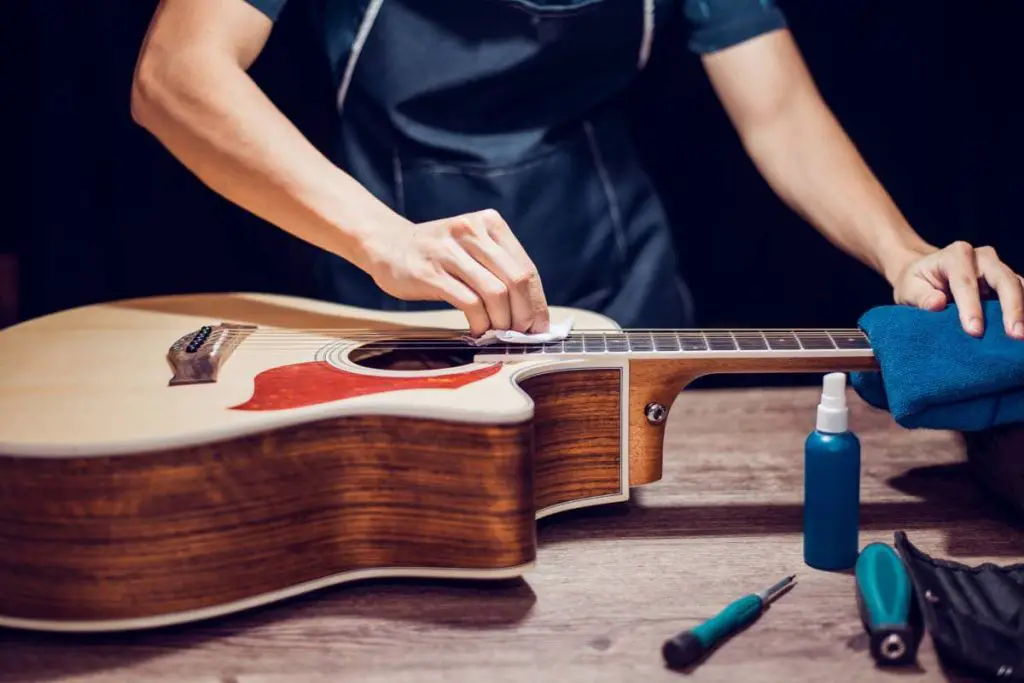
Standard products used to maintain your guitar include cleaners and polishes. However, before buying cleaners and polishers, you should know their ingredients. Cleaning products containing petroleum and solvent will likely damage the finish over time. On the other hand, some polishes contain abrasives that leave residue on your guitar’s wood.
For the guitar’s fretboard, use fine steel wool to remove any grime coating it. However, if you own an electric guitar, avoid using steel wool since it is magnetic and can distort the guitar’s performance. Instead, consider using a cloth made from non-abrasive material.
Afterward, you can use oils explicitly made to protect guitar wood but don’t over-apply them or clean the fretboard for too long. When done, you should wipe and rinse the instrument using a clean cloth. It would be best to clean the fretboard using said oils once a year, especially when there’s low humidity, to prevent cracks and shrinkage.
Moreover, for the strings, you should use a microfiber cleaning cloth to remove any dirt or oils that collect when you play. This can be essential especially for strings and knobs made using nickel components. That is because nickel tends to oxidize over time, and any dirt or debris on it will accelerate the oxidation process, resulting in rust.
👇😀👇NOTE👇😀👇
If you want to find out what my recommended guitar gear is, then here is what I recommend on Amazon:
- Fender Cutaway Acoustic-Electric Guitar Bundle (MY FAVORITE GUITAR)
- Snark SN-8 Super Tight All Instrument Tuner (Easiest Tuner I’ve Used😏)
- 6 String Acoustic Guitar Capo (Best CAPO for quick changes)
- Dunlop Max Grip 1.0mm Nylon Picks (Thick Guitar Pick So You Don’t Lose Grip!)
- Universal Guitar Stand (Cheap & Minimalist Guitar Stand I Recommend)
- Levy’s 2″ Wide Quick Adjust Guitar Strap (Best Guitar Strap For Any Level)

